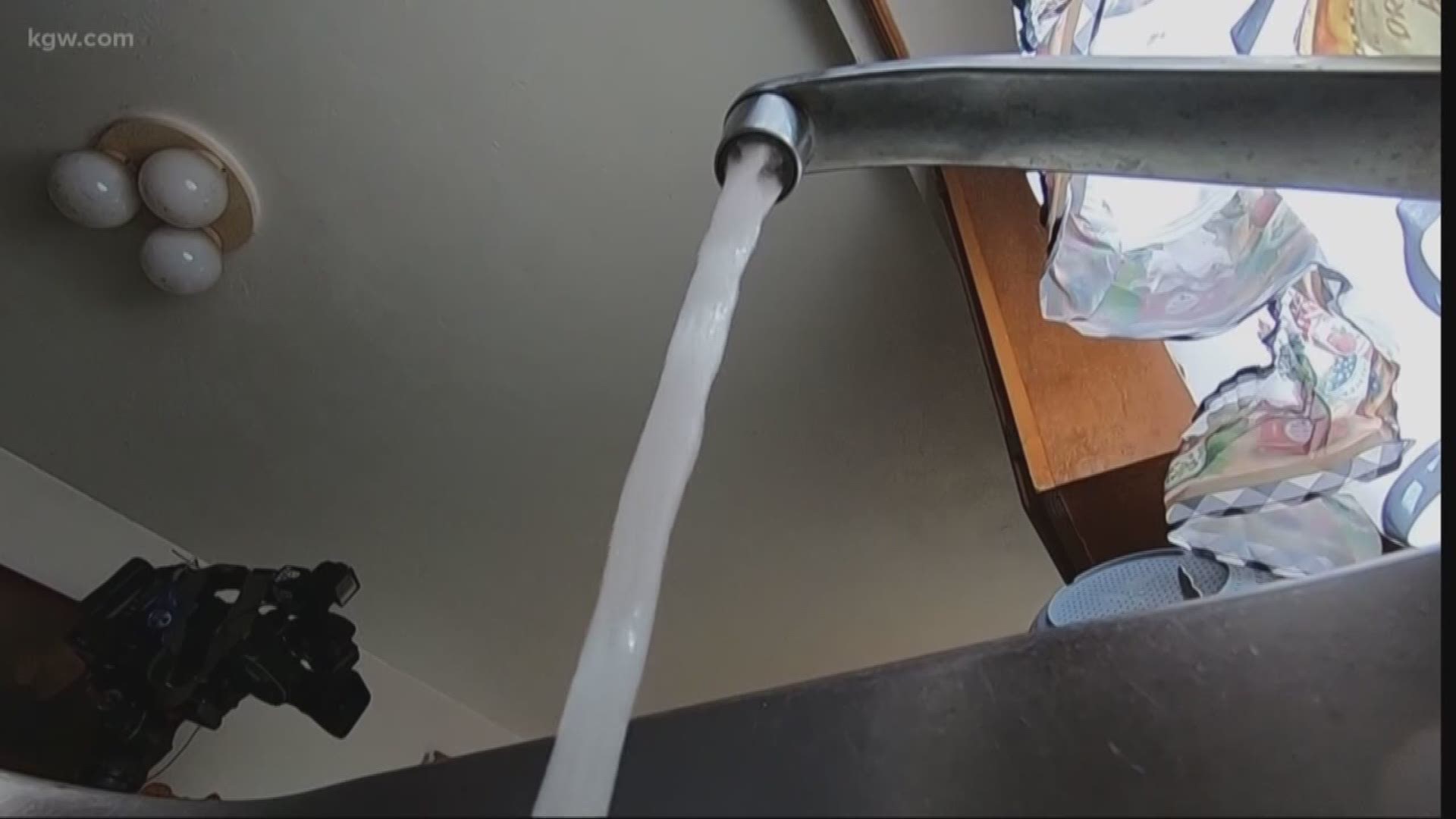SALEM, Ore. — Salem city officials said during a Monday press conference that they are considering the use of powdered activated carbon to remove toxins from their drinking water.
The short-term solution would cost $2 million this season and be absorbed by the budget, said Salem public works director Peter Fernandez. The city is also looking at using powdered activated carbon next season at about the same cost.
"We are fortunate that the council has adopted small and steady rate increases over the past 10 years so that we are well positioned financially, in the utility, to be able to afford these kinds of costs," Fernandez said.
Salem is also looking at longer-term solutions such as applying ozone to the water, which would carry a $20-$30 million price tag, Fernandez said.
Carollo Engineers has been working with the city of Salem to come up with a solution for the water situation. The idea of using powdered activated carbon to fight toxins is a novel one that hasn't been used in Oregon before, said Jude Grounds, associate vice president for Carollo Engineers.
Grounds said there's a lot of research that shows it has a high probability of working. He said other water treatments facilities in Oregon use powdered activated carbon but for a different purpose: to improve taste and odor. Grounds said they'll do about two weeks of testing at Salem's water treatment facility in Stayton, and will be watching to see if the powdered activated carbon treatment works to eliminate toxins from the water.
Salem officials also said they're hoping to cut substantially the length of time it takes to test water samples for cyanotoxins. The city purchased a $35,000 machine that will be able to test for the toxins, instead of sending samples to Ohio for testing. The machine is expected to arrive in Salem this week, and will be operating by the end of the week.
On Sunday, the city said results from tests taken on Friday indicated that the presence of cyanotoxins was below EPA advisory levels for vulnerable populations. The city decided, however, to extend the drinking water advisory for at least two more weeks as a precautionary measure.
"The results we received Sunday indicate the water is safe to drink for everyone," said Salem city manager Steve Powers, who said he has continued to drink the water throughout the advisory.
The water advisory applies to children under age 6, people with weak immune systems, people receiving dialysis or similar treatments, the elderly, pregnant and nursing women, and pets.
"The decision to extend the advisory, we understand may cause some concern among our residents and water customers," Powers said Monday. "We received considerable feedback ... that the on-again, off-again nature of our advisory was causing confusion. I believe extending the advisory until we can assure our residents that the water is safe to drink is the best course of action."
Before Sunday's test results, the city announced that samples taken Wednesday found cyanotoxin levels above EPA advisory levels. At the time, they said the warning would not be lifted until the city received two straight days of clean water results.
Salem's water originates in Detroit Lake, which is going through an algae bloom that creates the natural poison cyanotoxins.
Water stations are set up at the following locations:
- AMF Firebird Lanes, 4303 Center St. NE, Salem
- Bush's Pasture Park, Mission St. entrance, 600 Mission St. SE, Salem
- Chemeketa Community College, Brown Parking Lot, 4000 Lancaster Dr. NE, Salem
- City of Keizer Civic Center, 4969 Rickman Rd NE, Keizer
- East Salem Suburban Water District, 3805 La Branch St. SE, Salem (8 a.m. to 8 p.m.)
- Former Cheverolet Dealership, 5325 Denver St., Turner
- Geer Park, 3071 State St., Salem
- Salvation Army Kroc Center, 1865 Bill Frey Dr, Salem
- Wallace Marine Park, 200 Glen Creek Rd. NW, Salem
- Woodmansee Park, 4629 Sunnyside Rd. SE, Salem
City officials encourage residents to bring their own containers.
Map: Salem water stations
Ariel Garcia has three children, including an 18-month-old. She told KGW she kept the family on bottled water even after the first warning was lifted.
“At this point they’re brushing their teeth, we’re washing our 18-month-old with bottled water and just trying to keep it out of their mouths and make sure everything is dry before they use it,” she said.
Garcia said she's not ready for a summer full of on-again-off-again warnings.
The city of Salem is doing its best to gear up for the possibility.
In response to Salem's drinking water crisis, the Oregon Health Authority announced it would prepare state rules that require testing for cyanotoxins throughout the state for certain bodies of water at-risk for toxic algae blooms.
State health officials expect temporary rules to be set up by the end of June to get Oregon through this algae-bloom season. Permanent rules would be finalized later.
Last time an advisory was in place, city councilors had taken issue with not being informed about it much sooner. They found out shortly before a May 29 council meeting after city staff had known there was a possible problem with the water since May 25.
This time around, city councilors were looped in much sooner. City Councilor Sally Cook said she received notification Wednesday morning from Deputy City Manager Kacey Duncan. "It's being handled much better," Cook said.
The Statesman Journal contributed to this report.

